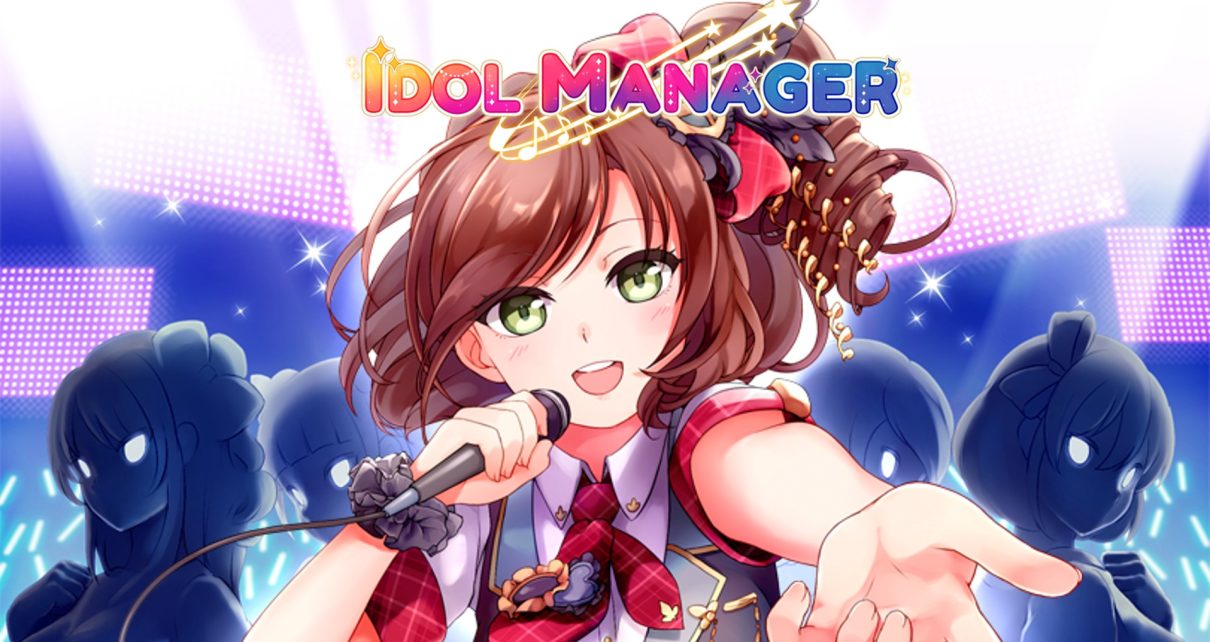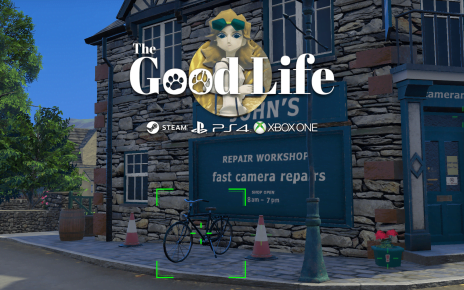Long a staple of Japanese media, idol culture has continued to grow its presence in the West. Series like BanG Dream and Love Live have grown in popularity due in large part to catchy songs and eye-catching outfits. And in Idol Manager, developed by GlitchPitch, you take the role of the producer of your very own idol group. Your decisions will decide whether your girls make it, or break it.

Your Company, Your Rules
Idol Manager, a management simulation, puts you in the reins of your own idol company. Not only do you get to name the company, but you’re also in full control of who passes auditions, stars in songs, or even who wins company popularity contests.
You also must manage your support staff. This includes coaches, doctors, and other office staff, who all play different roles in supporting your girls’ success. Of course, you’re in charge of paying all of them and directing their actions day-to-day.
Want to make a group targeting hardcore adult male fans, with a slant towards scandal? You can do that. Prefer marketing to teens and casual fans? Stick to producing Pop songs, and the world is your oyster. All you need to do is make sure you have enough money to tide you over to your next big payday.
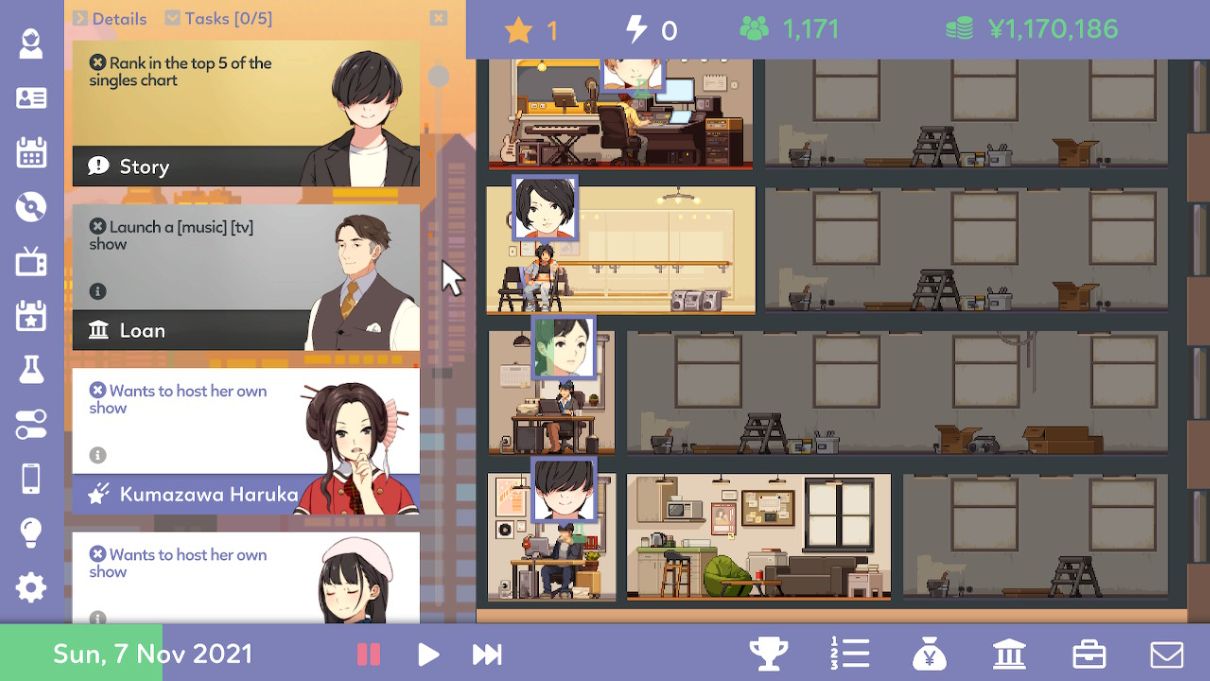
Systems Galore
Idol Manager features a wealth of systems for players to keep track of, some previously mentioned. Most of the players’ time is spent on the office building screen. From there, you can assign your various staff members to different tasks. Your sales managers are in charge of marketing and securing media promotions for your idols. Your coaches will help build up your idols’ singing and dancing skills, and help with the production of music and choreography for singles. In addition, you yourself as the producer work as a staff member, socializing with your idols and putting the finishing production touches on nearly every project.
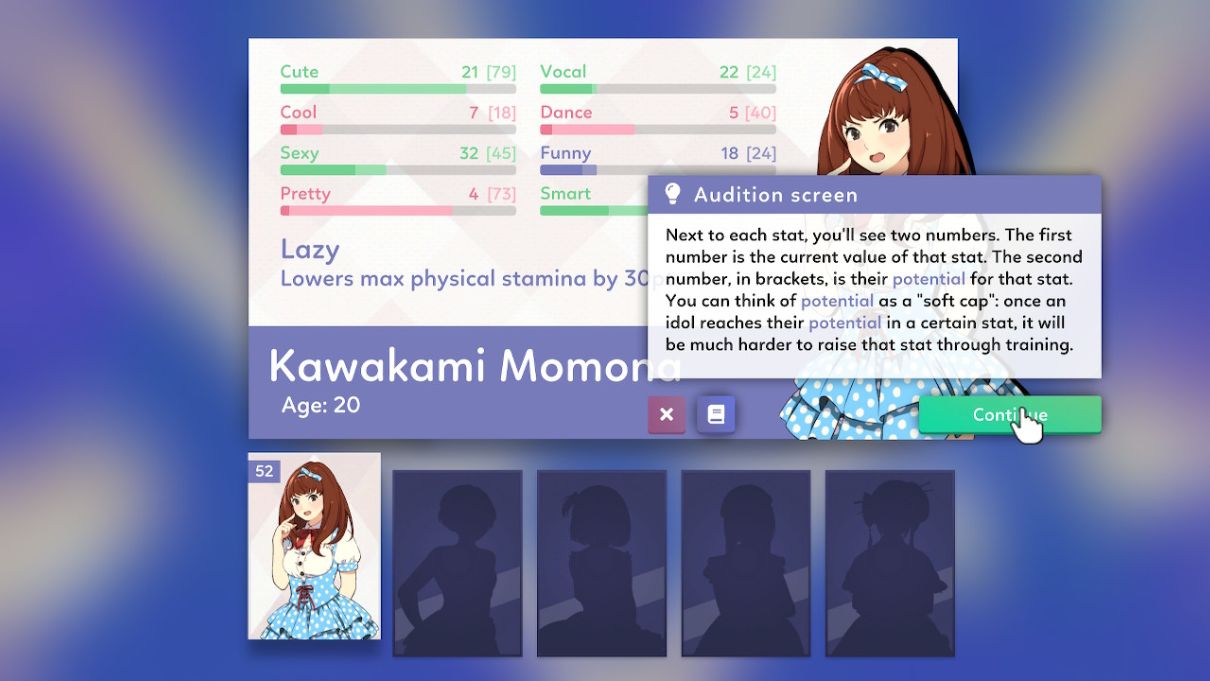
Of course, you can assign your idols to many tasks as well–but first, you need to hold auditions. Each audition is a gacha roll with five idol-hopefuls available–and just like a gacha, higher rarity idols have better stats and potential. Once hired, your idols are the lifeblood of your company. You’ll have them participate in songs, different promotions, shows, and more. They drive your profit–or losses.
It’s not a good strategy to be a taskmaster. Your idols have a set amount of physical stamina, and once spent, it’ll burn through their mental stamina, provided they don’t get injured first. If an idol gets injured or depressed, the game forces them on hiatus. Once on hiatus, an idol is unavailable for songs or concerts. Additionally, if an idol on hiatus was assigned to something like a TV show, your company will have to pay a penalty for breach of contract. To avoid this, players can construct break rooms, which passively restore physical stamina, or pay for their idols to take a spa visit.
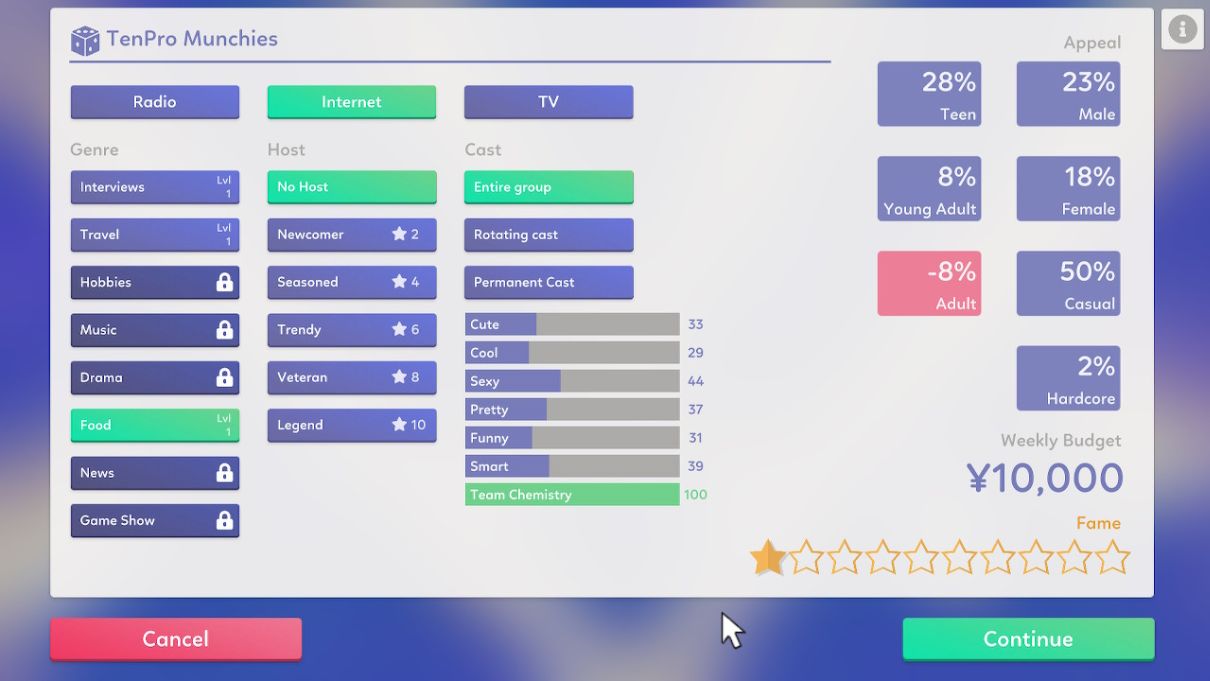
All of your staff and idols work together to make songs and shows, which are the source of most revenue in Idol Manager. As the producer, you select what each show and song is about–genre, and for songs, marketing strategy, lyrics, and choreography. Want to target a female audience? Try an R&B single. Going for a casual, teen vibe? Partying lyrics are your best bet. Or, you can chase trends, and spend research points to figure out just exactly what categories are popular at any given moment. Want to try something risky? A viral ad campaign has a chance of increasing sales by 1000%! And you might want to–a more successful single means more fans for your group.
Early on, it did feel like a bit much to manage all at once. I was using the pause button frequently, needing to stop the simulation to make sure I was using my time and money efficiently. But as I continued playing and got comfortable with shortcuts and menus, I found myself switching between menus efficiently, and using the fast-forward button more often than not.
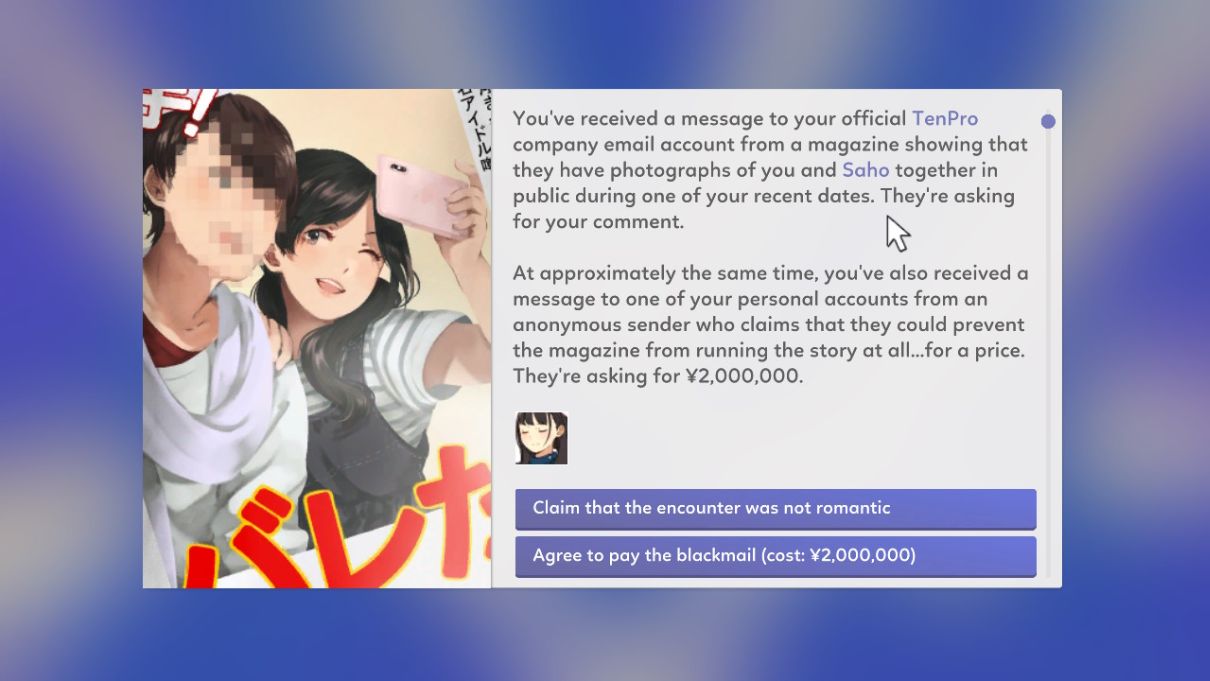
More Notoriety, More Problems
As your group grows, both in company size and in fan following, you’ll find that problems pop up more often than not. Idol Manager adds difficulty in the form of events. Some appear in windows, where you’re given a scenario and a choice of how to respond to the issue. In the one above (triggered by going on a date with one of my idols), I was able to pay off the paparazzi and face no consequences, outside of a 2 million yen hit to company accounts. Other events can appear in an ADV visual novel format–the ones I encountered were generally mediating issues between staff and idols.
Sometimes, the choices you make can have positive results–you can increase your friendship with idols, or increase a staff member’s stats. However, they can also damage your company. In one random event, an idol in my group was spotted on a date–I had the option of making a company apology, putting the idol on hiatus, or claiming it wasn’t her. I decided to claim it was another girl, however, the internet did not buy it. This resulted in my company accruing scandal points, which reduce fan growth and sales. You can get rid of scandal points by firing staff members or changing company policies–but accrue too many scandals too quickly, and you’ll find yourself unable to shed the heat.
Additionally, other events happen outside of your direct view. A ticker in the bottom right will sometimes alert you to a rumor that an idol is being bullied by her peers, or that one of your idols started dating someone. In order to find out what exactly is happening, players need to leverage existing relationships with idols–talk to them and find out. But if you haven’t chatted with them at all, they won’t be comfortable sharing that info with you.

Clever Writing, Awkward Pacing
I liked the writing in Idol Manager. It has some heartwarming moments, some dark moments, and some funny ones too. One random event that hit me was when one of my idols had pictures of herself in the past, obese, leaked online. I was provided with three options on how to respond to online harassment related to that, and I selected an option to pay out some websites to get the photos removed, which had a good result. Alternatively, I could have assigned her to an ad campaign as a weight-loss advocate–but with the flavor text hinting that she wanted to put the photos behind her, I feel like it would have been cruel to select. And the game is filled with events and moments like this, fictional, but that you could imagine happening in the real-life idol business.
Of course, with a story mode, there’s a series of events that push the narrative forward. The main story rotates around three characters–Fujimoto, your initial patron, Cocona, a rival producer, and Aya, a journalist. Each character has a route you can go down, provided you can complete the tasks they provide you. Each route focuses on different themes relating to the idol business: Fujimoto’s past in the underbelly of society, Cocona’s pursuit of idol perfection, and Aya’s chase for clicks and attention as an entertainment journalist.
Is it the peak of drama? No–but it’s not trying to be. And despite the scarcity of story events at times, I was invested in finding out what was going to happen next. It does its job moving the story along and helps keep the player invested in reaching the next management objective–when the objective is reasonably close, at least.
In my playthrough, it took me around twelve hours to get to the end of chapter 1, but only an additional two hours to reach the end of chapter 2. The pacing was not a huge issue for me as I was busy enjoying the management portion of the game. Despite that, I can see how it could get frustrating for folks who might want to have a more steady drip of narrative to go alongside it.
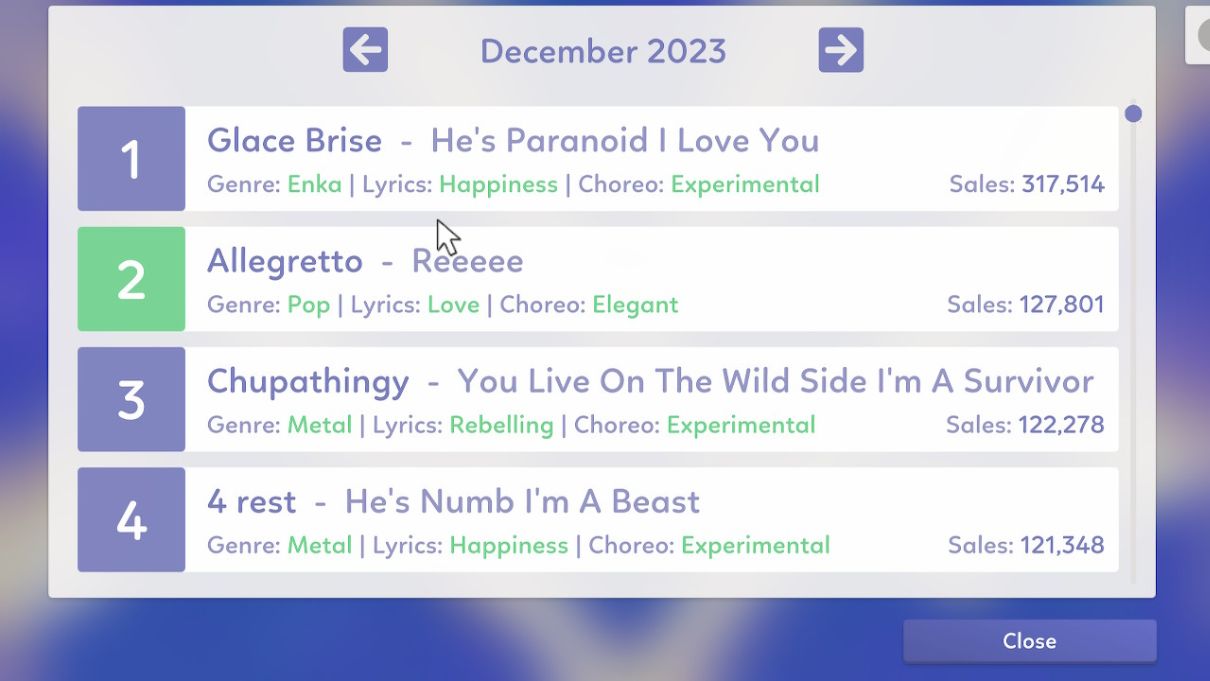
Glitches and UI Issues, with Some Positives
As a management simulation, Idol Manager has many menus to navigate. This by itself is not an issue but can take some time for players to acclimate to. However, one issue that repeated itself in my gameplay was menus for songs.
In Idol Manager, producing songs is a core part of gameplay–in my playthrough, I produced over 50 songs. After making such a large amount, I had to scroll multiple screens to get to my newest songs, and there were no sorting options for genre, choreography, or most sales, among others. Additionally, these menus were where I noticed the most pronounced lag, which while annoying, was not game-breaking.
Of note for Nintendo Switch users, the menu-intensive nature of this game makes the common Joy-Con drift issue very noticeable during gameplay. I was able to use a Switch Pro Controller and that resolved the issue for me. Users on Playstation or PC will likely not face this issue.
There were other small UI decisions that affected my experience, most notably the lack of a confirmation on the “return to main menu” button, which is directly above the “save” button. As a result at one point, I navigated to the main menu by accident, and when I got back to my save, I had lost four months of in-game simulation time! Thankfully, I was saved by the game’s autosave function, but I faced some serious save-file dread for 15 seconds there.
I also do appreciate the game’s cursor speed and cursor navigation options, which were a nice touch to add to the console version of the game.
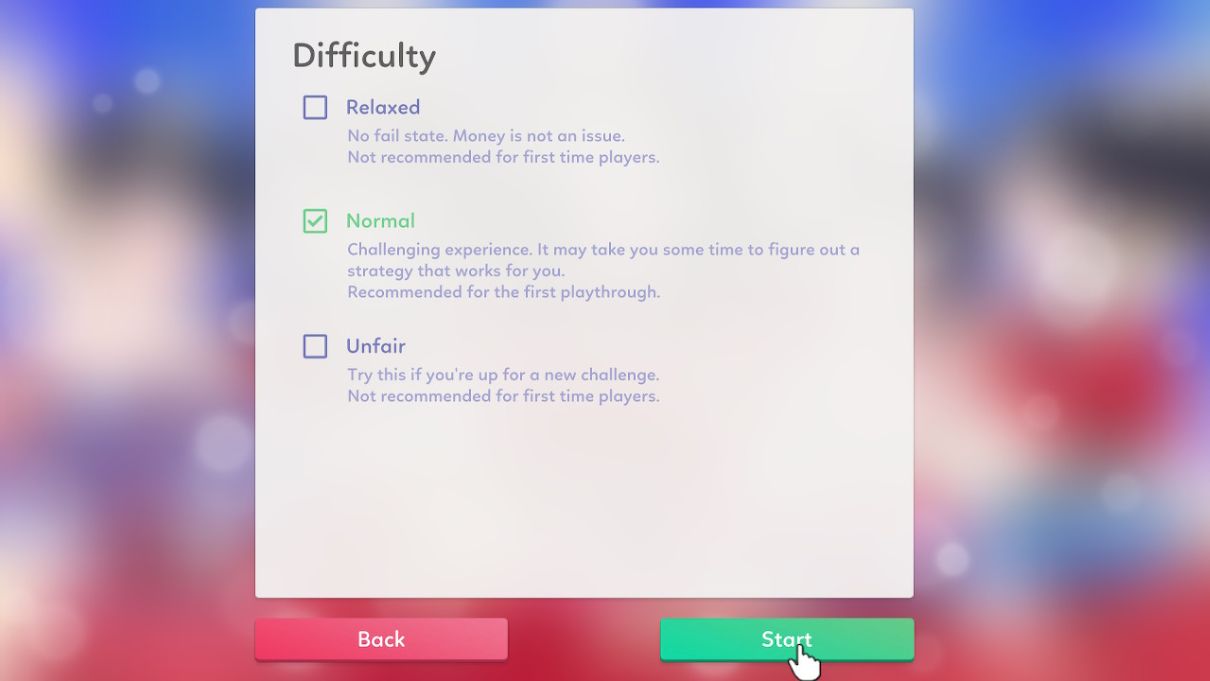
Replayability
In addition to the three routes available in story mode, GlitchPress included a free play mode for folks who might want to focus on the management alone. Outside of difficulty options, players can also opt to toggle random events and dating scandals, among other options. Want to be a casanova producer with no consequences? All you! In my own gameplay, I wanted to keep a clean operation, so I kept scandal and risk to a minimum. In a second run, I definitely would play around with riskier options.
You do not have to complete story mode to unlock free play–a nice touch for folks who might not be interested in a story to go with their sim.

Verdict
Idol Manager is an enjoyable management simulator with a unique subject matter that hasn’t been seen in the genre before. The story has its moments, and any fan of idols will likely have a chuckle or make a grim nod at least once or twice. Additionally, it has some thoughtful difficulty and gameplay options in its free play mode that adds multiple ways for folks to enjoy a second or third playthrough. It does have some faults, most notably in its UI, but only so far as to be inconvenient. For fans of management sims and/or idol culture, Idol Manager is recommended.
IDOL MANAGER IS RECOMMENDED

If you would like to read about Simulation games, you might be interested to read this review of Pups & Purrs: Animal Hospital
Many thanks go to PLAYISM for a Nintendo Switch review code for this title.

An aca-fan who leans more into fan than academic, Pieman likes to read, game, and enjoy VTubers leisurely with a beer in hand. He’s also an unabashed isekai enjoyer who’s always on the lookout for the newest world. Catch his sporadic tweets, Twitch streams, and endless stream of VTuber-related likes on @Piemanmj

